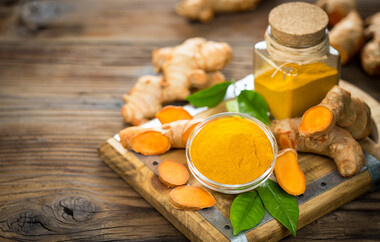
There are many ways to prevent infection with flu and cold viruses. Among other things, there are powerful helpers from nature. One example is turmeric.
Wintertime is cold season. People everywhere are sniffling and coughing - and before you catch a cold or even flu yourself, you should protect yourself well. A warm scarf alone usually doesn't help. Good hygiene is important: if you wash your hands frequently and avoid touching objects that are highly frequented, you are already making a good contribution to your health. Using shopping trolleys in the supermarket, door handles or handrails is a particularly high risk of catching flu.
"The annual wave of flu usually starts in January, but then lasts for three to four months. In addition, there are numerous more harmless colds with their unpleasant and, in the worst case, long-lasting accompanying symptoms. Besides the much-discussed vaccination against influenza, there are other, chemical-free ways to protect yourself as early as possible," says Natura Vitalis founder Frank Felte (www.naturavitalis.de). The company from Essen has long been considered one of the leading manufacturers of natural food supplements and places the highest value on continuous further and new developments of health products on a scientific basis.
But what is the difference between the flu and a cold? A real flu, also called influenza, is a viral infection that mainly affects the respiratory tract. It can be recognised by a sudden high fever accompanied by malaise, headache, aching limbs, chills, sore throat and cough. Flu is highly contagious, and patients belong in bed and under medical care for at least a week.
Frank Felte explains: "In contrast, a cold is an acute infectious disease of the mucous membranes in the throat, bronchi or nose. It is caused by viruses, sometimes also by bacteria. A cold usually starts with a runny nose, hoarseness and, during the night, a strong cough and a very blocked nose. Affected people feel weak and listless and have difficulty swallowing and breathing. They may also have a raised temperature at night."
Flu and cold viruses are transmitted through droplets from sneezing or coughing and can be transmitted and spread very quickly through the objects that the sick person has touched. In addition to the tried and tested household remedies such as daily nasal irrigation, inhalations, sage tea and sage candies or honey milk, you should drink a lot and ensure that the air is well humidified in heated rooms. Vaccinations and antiviral medicines are available.
"However, there is a great need for safer options due to side effects and the development of drug-resistant viruses. One of these is curcumin, i.e. the most important bioactive component of turmeric," emphasises Frank Felte. Turmeric is a spice that belongs to the ginger family. It has a strong aroma and spicy flavour and a characteristic golden-yellow hue. Curcumin is blessed with a variety of extraordinary medicinal properties, which Natura Vitalis has collected in the product "Curcuma Plus".
The curcurmin contained in turmeric has antibacterial and analgesic effects and acts as a real booster for the immune system. Numerous studies have shown that turmeric is just as effective against inflammation in the body as many a relevant drug, Frank Felte points out. And: "Various studies also suggest that turmeric generally has a protective function against many respiratory diseases. The mechanism of action can probably again be explained by its strong anti-inflammatory and antioxidant potential."
This text may contain translation errors as the translation was done by
an online translation tool.










